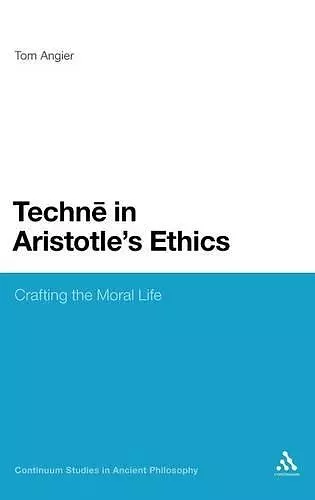Techne in Aristotle's Ethics
Crafting the Moral Life
Format:Hardback
Publisher:Continuum Publishing Corporation
Published:31st Jan '11
Currently unavailable, and unfortunately no date known when it will be back

Argues for the importance of the concept of 'techne' in constructing a new understanding of Aristotle's moral philosophy.
Presenting an account of 'Aristotle's Ethics', this book argues for the importance of the concept of 'techne' in constructing an understanding of Aristotle's moral philosophy. It explores the importance of 'techne' in the Platonic and pre-Platonic intellectual context in which Aristotle was writing.A new account of Aristotle's Ethics, this book argues for the central importance of the concept of techne or craft in Aristotle's moral theory. Exploring the importance of techne in the Platonic and pre-Platonic intellectual context in which Aristotle was writing, Tom Angier here shows that this concept has an important role in Aristotle's Ethics that has rarely been studied in Anglo-American scholarship. Through close-analysis of the primary texts, this book uses the focus on techne to systematically critique and renew Aristotelian moral philosophy. Techne in Aristotle's Ethics provides a novel and challenging approach to one of the Ancient World's most enduring intellectual legacies.
'Angier's rigorous defence of the centrality of craft models and metaphors in Aristotle's ethics is a significant contribution to Aristotelian scholarship with which we would do well to engage.' -- Julie Ponesse, Bryn Mawr Classical Review 2011.10.36
'By identifying the extent to which Aristotle's thinking about ethics was shaped by notions drawn from the crafts Angier has thrown new light on a surprising number of topics and has deepened our understanding of tensions within Aristotle's thought.It is by now a rare achievement to have said something new, true and important about Aristotle.' Alasdair MacIntyre, Emeritus Professor of Philosophy, University of Notre Dame, USA. -- Alasdair MacIntyre
'Sharp in its argumentation and impressively conversant with secondary literature. It is well written and clear. Even where the reader does not agree with the conclusions defended, he or she should still profit from the challenge of the book's reasoning and its conversance with Aristotle's difficult text. That Aristotle's reflection upon the arts shapes his ethical thought quite as much as Angier proposes is unlikely, but nonetheless the case is energetically and skilfully made.' Ron Polansky, Duquesne University -- Ron Polansky * Notre Dame Philosophical Reviews *
ISBN: 9780826462718
Dimensions: unknown
Weight: unknown
192 pages